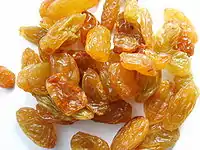raisin
English

Etymology
From Middle English raysyn, borrowed from Anglo-Norman reysin (“dried sweet grape”), from Old French raisin (“grape”), from Vulgar Latin racīmus, from Latin racēmus. Cognate with Persian رز (raz, “vine”). Doublet of raceme.
Pronunciation
- IPA(key): /ˈɹeɪzn̩/, /ˈɹeɪzən/
- (obsolete) IPA(key): /ˈɹiːzən/
Audio (US) (file) - Rhymes: -eɪzən
Usage notes
In the USA, raisin refers to any kind of dried grape. In the UK, Australia and New Zealand, raisin is reserved for the dried large dark grape, with sultana meaning the dried large white grape, and currant meaning the dried small Black Corinth grape.
Derived terms
Translations
|
|
Verb
raisin (third-person singular simple present raisins, present participle raisining, simple past and past participle raisined)
- (intransitive) Of grapes: to dry out; to become like raisins.
- 2008, John Winthrop Haeger, Pacific Pinot Noir
- Second-crop fruit tends to show smaller clusters than first-crop, to have a high skin-to-juice ratio, and to be a good blending tool, according to Iantosca, although care must be exercised to ensure that the second-crop berries have not raisined.
- 2008, John Winthrop Haeger, Pacific Pinot Noir
French
Etymology
From Old French raisin, from Vulgar Latin *racīmus, from Latin racēmus. Doublet of racème, a borrowing.
Pronunciation
- IPA(key): /ʁɛ.zɛ̃/
audio (file)
Noun
raisin m (plural raisins)
Derived terms
- raisin de loup
- raisin de mer
- raisin de renard
- raisin d'ours
- raisin sec
Further reading
- “raisin” in le Trésor de la langue française informatisé (The Digitized Treasury of the French Language).
Old French
Etymology
From Vulgar Latin racīmus, from Latin racēmus.
Pronunciation
- IPA(key): /rajˈzĩn/
References
- Godefroy, Frédéric, Dictionnaire de l'ancienne langue française et de tous ses dialectes du IXe au XVe siècle (1881) (raisin, supplement)
- raisin on the Anglo-Norman On-Line Hub